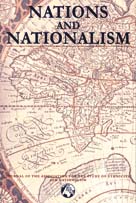Crossref Citations
This article has been cited by the following publications. This list is generated based on data provided by
Crossref.
KÖNIG, Matthias
2000.
Religion and the Nation-State in South Korea: A Case of Changing Interpretations of Modernity in a Global Context.
Social Compass,
Vol. 47,
Issue. 4,
p.
551.
Lustick, Ian S.
and
Miodownik, Dan
2002.
The institutionalization of identity: Micro adaptation, macro effects, and collective consequences.
Studies in Comparative International Development,
Vol. 37,
Issue. 2,
p.
24.
In-Sook, Kwon
2005.
How Identities and Movement Cultures Became Deeply Saturated with Militarism: Lessons from the Pro-democracy Movement of South Korea.
Asian Journal of Women's Studies,
Vol. 11,
Issue. 2,
p.
7.
CHOE, HYUN
2006.
National Identity and Citizenship in the People's Republic of China and the Republic of Korea.
Journal of Historical Sociology,
Vol. 19,
Issue. 1,
p.
84.
Herrmann, Richard K.
and
Choi, Jong Kun
2007.
From Prediction to Learning: Opening Experts' Minds to Unfolding History.
International Security,
Vol. 31,
Issue. 4,
p.
132.
Han, Do-Hyun
2007.
Cinema, Law, and the State in Asia.
p.
141.
Marques, José M.
and
Paez, Darío
2008.
Bilans et perspectives en psychologie sociale.
p.
71.
Kang, Jin Woong
2008.
The Dual National Identity of the Korean Minority in China: The Politics of Nation and Race and the Imagination of Ethnicity.
Studies in Ethnicity and Nationalism,
Vol. 8,
Issue. 1,
p.
101.
KALICKI, KONRAD
2009.
Electoral Rights beyond Territory and beyond Citizenship? The Case of South Korea.
Japanese Journal of Political Science,
Vol. 10,
Issue. 3,
p.
289.
Williams, Brad
and
Mobrand, Erik
2010.
Explaining Divergent Responses to the North Korean Abductions Issue in Japan and South Korea.
The Journal of Asian Studies,
Vol. 69,
Issue. 2,
p.
507.
Kim, Bowon
2010.
Cultural forces and historical events to shape organizing principles in Korea.
Management Decision,
Vol. 48,
Issue. 5,
p.
826.
Yi, Crystal
2010.
A Beckoning from the Past: An Examination of Korean Identity in the 20th Century Through the Case Studies of Two Korean Individuals.
SSRN Electronic Journal,
Watson, Iain
2011.
Global Korea: foreign aid and national interests in an age of globalization.
Contemporary Politics,
Vol. 17,
Issue. 1,
p.
53.
Kang, Jin Woong
2012.
The disciplinary politics of antagonistic nationalism in militarized South and North Korea.
Nations and Nationalism,
Vol. 18,
Issue. 4,
p.
684.
Mycock, Andrew
2012.
SNP, identity and citizenship: Re-imagining state and nation.
National Identities,
Vol. 14,
Issue. 1,
p.
53.
이동엽
강승혜
and
최윤정
2012.
A Study on Multicultural Education for Korean Secondary Students.
The Journal of Cultural Policy,
Vol. 26,
Issue. 1,
p.
254.
Lee, Helene K.
2013.
“I'm my mother's daughter, I'm my husband's wife, I'm my child's mother, I'm nothing else”: Resisting traditional Korean roles as Korean American working women in Seoul, South Korea.
Women's Studies International Forum,
Vol. 36,
Issue. ,
p.
37.
Silcott, William
and
Kreinath, Jens
2013.
Transformations of a ‘religious’ nation in a global world: Politics, Protestantism and ethnic identity in South Korea.
Culture and Religion,
Vol. 14,
Issue. 2,
p.
223.
Mycock, Andrew
2013.
Literature of an Independent England.
p.
15.
Rhee, Young Ju
2014.
Voting from Abroad: 2012 Elections and the Overseas Koreans' Vote.
SSRN Electronic Journal,




